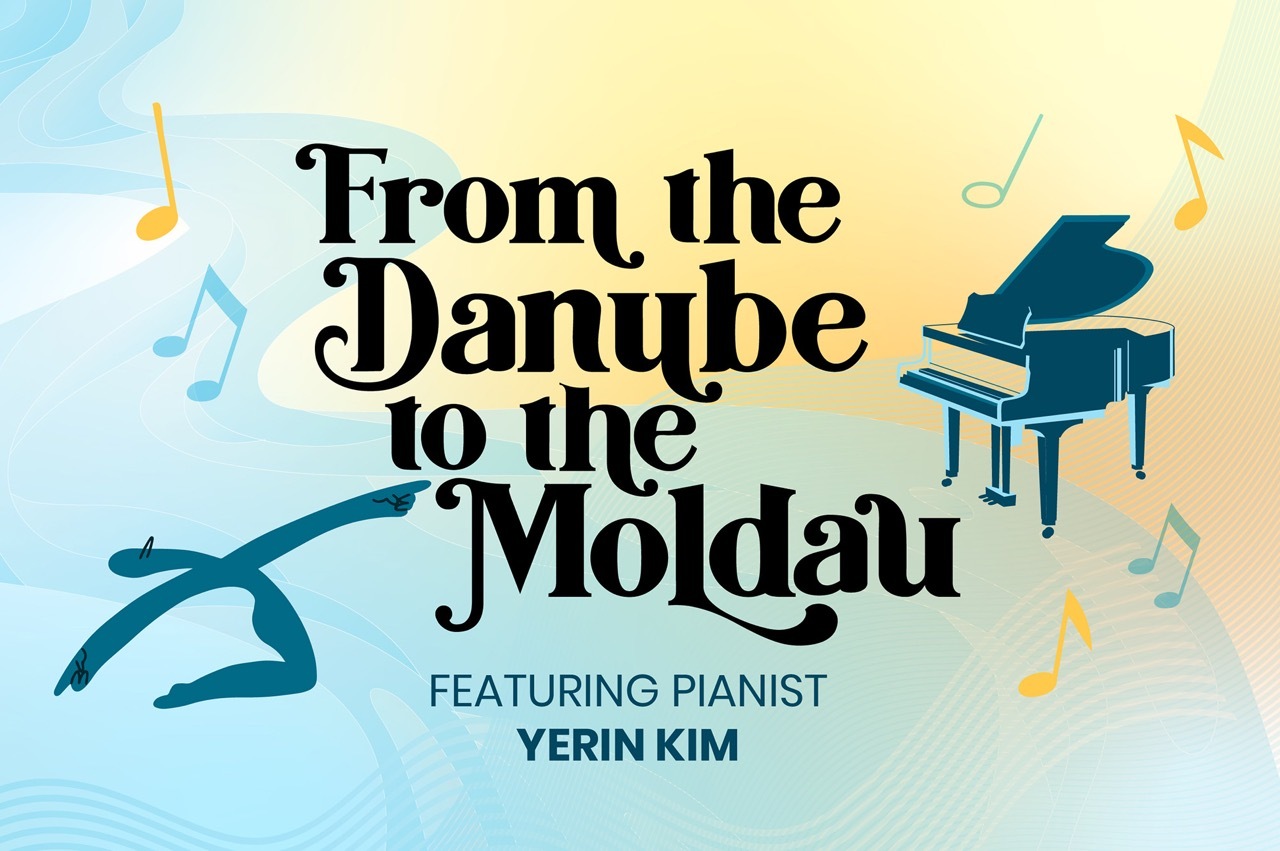
LAWRENCE GOLAN CONDUCTOR
YERIN KIM PIANO
JOHANN BAPTIST STRAUSS JR. On the Beautiful Blue Danube
WOLFGANG AMADEUS MOZART Piano Concerto No. 20 in D minor, K. 466
DUKE ELLINGTON The River
BEDŘICH SMETANA The Moldau
From the Danube to the Moldau is a symphonic journey through the great rivers of classical
music. Framing the program are two beloved masterpieces: Johann Strauss Jr’s On The Beautiful
Blue Danube, one of the world’s most famous waltzes, and Smetana’s The Moldau, a sweeping
tribute to the Czech river’s path. Duke Ellington’s The River adds a rich jazz-infused ballet score,
blending classical and swing-era brilliance. Along the route of the Danube in Vienna is the
birthplace of Mozart’s Piano Concerto in D Minor, which ties the program to the landscapes that
inspired these works.
-------------------------------------------------------------
Purchase More and Save with Symphony Flex Packs!
Click HERE to learn more!
-------------------------------------------------------------
Interested in VIP Parking or Valet Service for the season? Season parking passes are available for purchase here.
For details on free or accessible parking, questions about the venue, what to wear, or when to clap, you can check out our concert FAQs for quick answers.
This program is accompanied by Lunch with Lawrence at 11:30 AM on the Friday before the concert and ConcerTalk at 6:25 PM before the performance.
An der schönen blauen Donau (On the Beautiful Blue Danube), Op. 314 (1866)
On the Beautiful Blue Danube was first performed on February 15, 1867, at a concert of the Vienna Men’s Choral Association. After the original music was written, words were added by the Choral Association’s poet, Joseph Weyl. Finally, Strauss adapted it into a purely orchestral version for the World’s Fair in Paris (also in 1867), and this version is the most commonly performed today. Consisting of an introduction, five waltzes, and a coda, it has been one of the most consistently popular pieces of Strauss’s music in the classical repertoire.
—Dr. Jeffrey Snedeker
Piano Concerto No. 20 in D minor, K. 466 (1785)
In 1781, Mozart moved to Vienna to pursue a living as a free-lance musician by teaching and publishing, performing at patrons’ houses or in public, soliciting individual commissions, and composing piano concertos that he could also perform himself. Mozart’s twentieth piano concerto was premiered in Vienna on February 11, 1785, with the composer as soloist. The first movement begins darkly, gradually livens up, but never truly becomes happy, ending quietly with nothing resolved. The second movement is much more peaceful but includes some surprising contrasts. The third movement begins restlessly. A bright contrasting section tries to change the mood, but the restlessness soon returns. The cadenza seems to be where everything gets worked out, and the piece ends in a jubilant mood. This is one of Mozart’s most popular concertos, foreshadowing the Romantic pathos on the horizon.
—Dr. Jeffrey Snedeker
The River (1970)
Born into a musically-inclined Washington, DC, family, Edward “Duke” Ellington was encouraged to play piano from a very early age. By the mid-1920s, he was a successful performer and businessman, and began composing in various genres. His compositional style progressed from ragtime to big band to larger-scale compositions of increasing complexity and symbolism. In addition to popular songs, Ellington also wrote successful operas, musical comedies, ballets, soundtracks, sacred music, and tone poems.
The River was commissioned by Lucia Chase to celebrate the American Ballet Theater’s 30th anniversary. Alvin Ailey was hired as choreographer and the orchestral parts were arranged by Ron Collier. The ballet’s premiere took place at Lincoln Center on June 25, 1970. Ellington described The River a metaphor of a person’s life, flowing from its source to the sea, representing birth to death.
Spring: a trickle of water gradually grows in breadth and depth—birth and self-awareness.
Meander: slow, with serious and light moments—comfort at home, gaining confidence, exploring options, deciding to take a chance.
Giggling Rapids: expressions of freedom—joy in exploration and newness, collapsing in happy exhaustion.
Lake: a variety of styles and colors—the world is bigger and more complicated than expected.
The Vortex: coming upon rapids and navigating their swells and outbursts.
The Falls: descending figures take the music over the edge to a crashing halt.
Village of the Virgins: a calm chorale grows and arrives at majestic music—arriving at maturity; the river broadens and deepens.
Riba: upbeat jazz “licks” represent the anticipation of rebirth as the river flows to the sea.
—Dr. Jeffrey Snedeker
Vltava (The Moldau) (1874)
Smetana began writing nationalistic music in his twenties, inspired by the 1848 Prague uprising. Vltava (The Moldau) is one of six symphonic poems composed between 1874 and 1879, each depicting some aspect of the countryside, history, or legends of Bohemia. Vltava was premiered on April 4, 1875, and is Smetana’s best-known and most internationally popular orchestral composition. The composer said:
The composition describes the course of the Vltava, starting from the two small springs, the Cold and Warm Vltava, to the unification of both streams into a single current, flowing through woods and meadows [including a hunting scene], through landscapes where a peasant wedding is celebrated, and a round dance of the mermaids in the moonlight. Above, the nearby rocks, castles, palaces, and ruins loom proudly. The Vltava swirls into the St John’s Rapids, then it widens and flows toward Prague, past the Vyšehrad castle, and majestically vanishes into the distance, ending at the Elbe.
—Dr. Jeffrey Snedeker
Praised by the International Piano Magazine as “pianist of beautiful finesse and golden tone”, pianist Yerin Kim is a recitalist, chamber musician, and educator. She has given concerts in various festivals and recitals in major venues internationally, including The Kennedy Center in Washington D.C., Carnegie Hall in New York, Place Flagey in Brussels and Rolston Hall at the Banff Centre for the Arts in Canada.
Her solo debut album "First and Last Words", works by Robert Schumann and Alfred Schnittke, was released by the Sheva Collection Label in Spring 2019. Phoenix Classical, one of the foremost promoters of Classical recordings across the world, remarked on the album as “powerful and engaging, very poetic and expressive with some truly original interpretive insights, all performed with a great technique”. The album has garnered critical acclaim from major classical music magazines, including the International Piano Magazine, Fanfare Magazine, and The Wholenote Magazine. Partnering with violinist Brendan Shea as the Shea-Kim Duo, they perform a wide range of music for a broad audience across the world and have gained critical acclaim from major magazines and critiques; “the duo of Shea and Kim work exquisitely as a team, overlapping their lines so seamlessly they become inseparable” (Strings Magazine), “the duo creates a rich and intimate atmosphere, as they navigate the thrills and spill” (BBC Music Magazine), and “this duo is very reluctant to hold back, they frankly play the bejeezus out of it” (American Record Guide). Their debut performance in Seoul, South Korea was recorded live and published by Ark Studio, and since then have released “The Sound and the Fury” (2022) and “All Roads” (2023) under Blue Griffin label. Their latest album “Touch” will be released in summer of 2025.
As a regular lecturer, Kim performs and gives talks on promoting awareness of the power of music in the community that it serves, especially in the field of music and medicine. She has been invited to give lectures for prominent educators and students at Indiana University, Bloomington, the Nantucket Project, Music Teachers National Association, the Universal Arts Institute in Seoul, South Korea, among others. She founded a Sensory Friendly Music and Autism Concert Series that has served autistic individuals and communities in New York, Indiana, and Washington state. She also founded and Co-directs Chamber Music in the Bend with her husband and violinist Brendan Shea. Her passion for pre-college educational and community engagements lead to founding the CWU Summer Literacy for Youth in Music, a music camp designed for children of migrant families of Washington state and local children to be taught by CWU collegiate music educators trained under the guidance of CWU faculty. She also founded and directs CWU PianoFest, a piano festival and competition where some of the most talented pre-college and college students of the West Coast are invited to CWU campus to perform.
Kim currently teaches at Central Washington University as the Director of Keyboard Studies. Prior to joining Central Washington University, she taught at the University of Notre Dame and Indiana University, Bloomington. She also enjoys pre-college teaching and has taught talented young students from pre-college programs at Indiana University, Bloomington and State University of New York Stony Brook. Kim holds a Double Degree in Piano Performance and Psychology from Oberlin conservatory and college, a Master of Music from Indiana University Bloomington, and Doctor of Musical Arts from State University of New York, Stony Brook. Her mentors and teachers include Hans Boepple, Seunghae Choi, Haewon Song, Arnaldo Cohen, Jean-Louis Haguenauer, and Gilbert Kalish.
 |
|---|